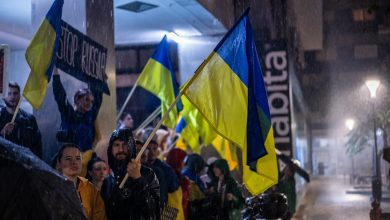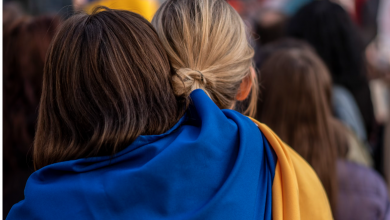Report // Top 5 harmful narratives addressed to Ukrainian refugees in Moldova. Sources and risks

Since the start of the war in the neighboring country, numerous misleading or hateful messages have been spread about Ukrainian refugees settled in Moldova, including through the media and social networks, according to the report “Risks to Community Cohesion Between Ukrainian Refugees and Host Communities”, made public by the International Foundation for Electoral Systems (IFES). According to the authors, these narratives fuel resentment, promote discrimination, and reduce social cohesion.
According to the study, the economic crisis, inflation, and growing unemployment contributed to increasing the vulnerability of the Moldovan population to negative messages. Many discourses compare the situations of Ukrainians and Moldovans, often contrasting the perception of refugees’ wealth and the difficulties faced by elderly, jobless, and disabled Moldovans. The most vulnerable to this type of messages are Moldovans in precarious situations, the unemployed, and people with limited incomes. Ethnic and cultural groups with a history close to Russia are also more exposed to these messages, such as ethnic Gagauz and Russians in Moldova, seen as more reluctant to the government and more skeptical about the war in Ukraine.
The research highlights the five most popular messages, the categories most likely to fall prey to them, the media through which they were or are distributed, the risks they involve, and a number of solutions designed to counter hate speech against Ukrainian refugees in Moldova.
“Ukrainians are rich, drive around in fancy cars, and spend their time in malls and cafés while locals are working; they’re here on holiday—they don’t need assistance.”
This narrative seeks to invalidate the experience of refugees and undermine the validity of their refugee status and eligibility for assistance. The suggestion that Ukrainians treat the forced displacement situation as a holiday ties in with themes that they do not want to work and minimizes the impact of the increased cost of living on Ukrainians.
This discourse spread, the study authors noted, through the comment sections of online posts; on social media platforms such as Facebook, Telegram, TikTok, and Viber; in traditional media; and by word of mouth.
“Refugees are supported more financially and get better benefits than the local population; help to refugees comes at the cost of the local population: ‘We should help our poor, not the Ukrainians’.”
This discourse juxtaposes the situation of Moldova’s vulnerable population, “our poor”, with that of Ukrainian refugees, refugees being seen as foreigners who receive support instead of vulnerable Moldovans. This narrative is linked to anti-government messages suggesting that the government is helping refugees more than Moldovans.
According to the study participants, this narrative was especially disseminated through television stations that broadcast Russian disinformation and information about the war, such as TV6 and Orhei TV; at briefings and interviews with political figures for Russian-language television and radio; during anti-government protests and events organized by political actors. This message also spread through social media platforms such as Telegram channels (e.g. Eurasia Daily), OK.ru, VK.ru, Facebook, and Russian influencers.
“Refugees are ungrateful, have high expectations and demands for support and shelter, and they abuse hospitality; they leave messy apartments and are disrespectful; they are selective about the types of support that they receive: they don’t want to live in small cities and only want certain types of products.”
This narrative seeks to demonize Ukrainians since their arrival in Moldova. This reflects the experience of some Ukrainian participants in the study, who felt that landlords perceive them as unreliable, bad tenants, more likely than Moldovans to steal or damage rented properties. This discourse can be exaggerated or used to distort legitimate concerns, such as the need for livable conditions, as manifestations of materialism, the study reports. These messages were also disseminated through online platforms, including Viber, Telegram, and TikTok.
“Economic challenges and the energy crisis are fueled by hosting refugees (‘They drive prices up’).”
The arrival of Ukrainian refugees in Moldova coincided with macroeconomic challenges for the country, since both are directly related to the war in Ukraine. The study participants noted that this discourse spread through word of mouth, as well as through social platforms, including Facebook, TikTok, and Instagram, in the comments sections.
“New arrivals from Ukraine are taking jobs from the local population, they are willing to work for significantly lower wages, they are destroying the labor market.”
This discourse seeks to blame Ukrainian migrants for Moldova’s economic challenges. It targets people with lower incomes and suggests that refugees are making the situation of
Moldovans more precarious, while also presenting Ukrainians as a threat to the Moldovan labor market at the expense of the local population. Participants indicated that this type of message was mostly shared on TikTok, OK.ru, Viber, and Telegram.
THE RISKS
The call for hate speech against refugees fuels resentment among communities, breeds discrimination, and reduces support for acceptance of and help for refugees, the report found.
One of the risks lies in the potential increase of hostility against Ukrainians, worsening the situation of the most vulnerable in the refugee community. While most Moldovans remain supportive of refugees, disinformation has led to online attacks and aggression against them. The comment sections of political leaders’ websites regularly include accusations that the country accepts too many refugees or that they are responsible for thefts and destruction of property, the report said.
The perception that Ukrainians with children can cause property destruction, for example, fuels discrimination that restricts Ukrainians’ participation in the Moldovan society. The acceptance of discrimination and internalization of negative attitudes towards refugees can also lead to denial of key public services or refusal of support by Ukrainians who do not want to be subjected to possible negative reactions. There are also risks of Ukrainians being made scapegoats for various challenges in Moldova, such as rising inflation, for example.
At the same time, reactions against disinformation are perceived as authoritarian. According to the study, many Moldovans feel sympathy towards the Russian state, partly due to historical and cultural ties. Therefore, discourses that put the Moldovan government against Russia can affect trust in the central public authorities.
The authors of the research recommend, among other things, promoting positive stories on social networks, such as topics about the relations between Ukrainian and host communities, support and solidarity, the contributions that Ukrainian refugees bring to the country.
The research was conducted between November 2022 and March 2023. The team initially conducted document-based research. It was followed by a research workshop in Chisinau on March 1-2, attended by 52 experts from the government, multilateral organizations, local and international NGOs, and academia, involving a total of 229 participants.




